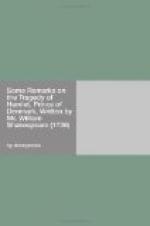Such examples suggest the seminal quality of the best of this little book. The writer was obviously a man who read closely and reflected to good effect on what he read, with the result that he saw new things and helped open new problems and point the way to a generally more fruitful study of his author. Because of this and its prevailing sound critical qualities the anonymous essay ranks with the more important Shakespearian documents of the century. The editors of the Augustan Reprints are to be commended for their decision to give it a place in their valuable series. A critical work which is so viable, which has so many points of contact with other good Shakespearian criticism, and which is in itself so stimulating in approach and specific idea deserves the added accessibility which such publication permits.
University of Michigan Clarence D. Thorpe
Reprinted from the British Museum copy by permission of The Trustees of the British Museum.
There is hardly any Thing which has been more abus’d than the Art of Criticism; it has been turned to so many bad Purposes among us, that the very Word it self has almost totally lost its genuine and natural Signification; for People generally understand by Criticism, finding fault with a Work; and from thence, when we call a Man a Critick, we usually mean, one disposed to blame, and seldom to commend. Whereas in Truth, a real Critick, in the proper Sense of that Word, is one whose constant Endeavour it is to set in the best Light all Beauties, and to touch upon Defects no more than is necessary; to point out how such may be avoided for the future, and to settle, if possible, a right Taste among those of the Age in which he lives.
Ill-nature, and a Propensity to set any Work in a ridiculous and false Light, are so far from being the Characteristicks of a true Critick, that they are the certain Marks whereby we may know that a Man has not the true Spirit of Criticism in him.
There is a Weakness opposite to this, which indeed is better natur’d, but is, however, vicious; and that is, the being bigotted to an Author; insomuch that Men of this Stamp, when they undertake to explain or comment upon any Writer, they will not allow him to have any Defects; nay, so far from that, they find out Beauties in him which can be so to none but themselves, and give Turns to his Expressions, and lend him Thoughts which were never his Design, or never enter’d into his Brain.
Of all our Countrymen, Mr._ Addison is the best in Criticism, the most exempt from the Faults I mention; for his Papers upon Milton’s Paradise Lost, I look upon as the true Model for all Criticks to follow. In those we see the Beauties and Faults of that great Poet weigh’d in the most exact and impartial Scales.
Those excellent Papers first gave me an Idea of publishing the following Sheets. Happy! if I can but any ways follow such a Guide, though at ever so great a Distance; since I am well persuaded, that by this Means I can never be totally in Error, tho’ I may sometimes deviate for want of proper Abilities!




